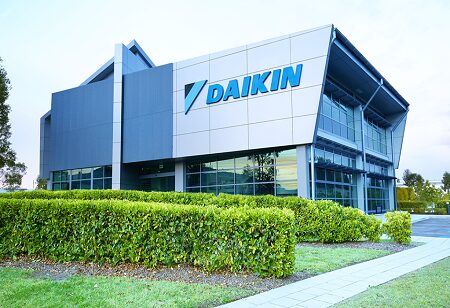Daikin Industries, Ltd., a leading multinational conglomerate, has firmly established itself as a global powerhouse in the air conditioning, refrigeration, and fluorochemicals sectors. Founded in 1924 by Akira Yamada in Osaka, Japan, Daikin has grown over the decades to become a pioneer in the HVAC (heating, ventilation, and air conditioning) industry. With a legacy of innovation and quality, the company continues to drive advancements in climate control solutions worldwide.
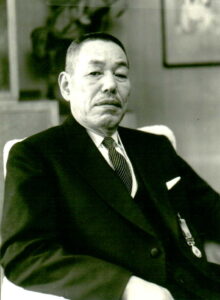
Daikin’s commitment to innovation is evident in its extensive research and development efforts. The company invests heavily in R&D to develop cutting-edge technologies that improve energy efficiency, environmental sustainability, and user comfort. One of Daikin’s notable innovations is the Variable Refrigerant Volume (VRV) system, introduced in 1982. This technology revolutionized the HVAC industry by allowing for individual zone control and reducing energy consumption, setting a new standard for commercial and residential air conditioning systems. This system has been continuously improved over the years, incorporating advanced features such as improved inverter technology, which further enhances energy efficiency and system reliability.
Sustainability is at the core of Daikin’s business philosophy. The company strives to create products that contribute to environmental preservation and reduce carbon footprints. Daikin’s commitment to sustainability is exemplified by its development of R-32, an environmentally friendly refrigerant with lower global warming potential (GWP) than traditional refrigerants like R-410A. The adoption of R-32 across its product lines highlights Daikin’s proactive approach to addressing climate change and regulatory requirements. Daikin is also involved in the Green Heart Factory initiative, which aims to create environmentally friendly factories through energy-saving technologies and sustainable practices.
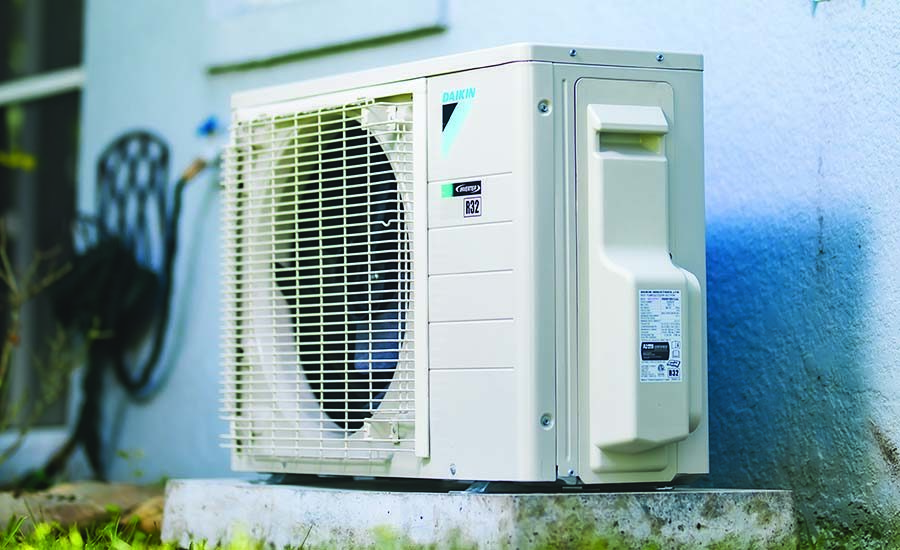
Daikin’s global presence is marked by its strategic expansion and acquisitions. The company operates in over 150 countries, with manufacturing facilities, research centers, and sales offices strategically located around the world. Notable acquisitions include the purchase of U.S.-based Goodman Global in 2012, which significantly strengthened Daikin’s position in the North American HVAC market. This acquisition allowed Daikin to leverage Goodman’s extensive distribution network and enhance its product offerings to meet diverse customer needs. Additionally, Daikin acquired AHT Cooling Systems, an Austrian refrigeration company, in 2018, further expanding its product portfolio and market reach in the commercial refrigeration sector.
Customer-centricity is a fundamental aspect of Daikin’s business strategy. The company places a strong emphasis on understanding and meeting the unique requirements of its customers. Daikin’s comprehensive range of products includes residential air conditioners, commercial HVAC systems, air purifiers, and refrigeration equipment. Each product is designed with a focus on reliability, durability, and ease of use, ensuring optimal performance and customer satisfaction. The company’s approach to customer service includes offering comprehensive warranties and a network of certified installers and service technicians to provide ongoing support and maintenance.
In addition to its product excellence, Daikin is dedicated to providing exceptional after-sales service. The company offers comprehensive support, including installation, maintenance, and repair services, to ensure the longevity and efficiency of its products. Daikin’s extensive network of service centers and trained technicians guarantees prompt and reliable assistance, reinforcing the company’s reputation for quality and dependability. The brand’s service approach emphasizes proactive maintenance and swift response times to minimize downtime and enhance customer experience.
Daikin’s commitment to corporate social responsibility (CSR) extends beyond environmental sustainability. The company actively engages in community development initiatives, educational programs, and disaster relief efforts. Daikin’s CSR activities reflect its dedication to contributing positively to society and improving the quality of life for communities worldwide. For example, Daikin’s collaboration with Habitat for Humanity provides affordable housing solutions and enhances living conditions in underserved communities.
As a leader in the HVAC industry, Daikin continues to set benchmarks for innovation, sustainability, and customer satisfaction. With its unwavering focus on research and development, strategic global expansion, and commitment to environmental stewardship, Daikin is well-positioned to address the evolving needs of the market and drive the future of climate control solutions. The company’s legacy of excellence and forward-thinking approach ensures that Daikin remains a trusted and influential name in the industry for years to come.
Marketing Strategies of Daikin
Daikin Industries employs a comprehensive and multifaceted marketing strategy to maintain its position as a global leader in the HVAC industry. The company’s approach encompasses product innovation, customer-centric solutions, digital transformation, and sustainability, each playing a vital role in its overall marketing strategy.
1. Product Innovation and Development
Product innovation and development are at the heart of Daikin’s marketing strategy, enabling the company to maintain its competitive edge in the HVAC industry. Daikin’s continuous investment in research and development (R&D) allows it to introduce cutting-edge technologies that address evolving consumer needs and regulatory requirements. For instance, the development of the Variable Refrigerant Volume (VRV) system in 1982 revolutionized the HVAC sector by providing energy-efficient, customizable climate control solutions for both commercial and residential buildings. This innovation set a new industry standard and demonstrated Daikin’s commitment to pioneering advancements in HVAC technology.
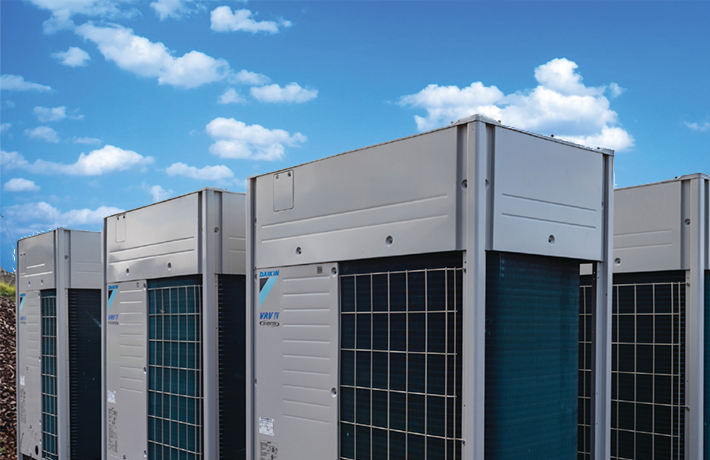
In recent years, Daikin has focused on integrating eco-friendly solutions into its product development to align with global sustainability trends. A notable example is the introduction of the R-32 refrigerant, which has a lower global warming potential compared to traditional refrigerants like R-410A. This environmentally friendly refrigerant has been widely adopted across Daikin’s product lines, underscoring the company’s proactive approach to reducing environmental impact and meeting stringent regulatory standards. By leading the shift towards more sustainable HVAC solutions, Daikin not only enhances its brand image but also meets the increasing consumer demand for eco-conscious products.
Additionally, Daikin continuously seeks to enhance user experience through smart technologies and product customization. The company has developed air conditioning units that can be controlled via smartphone apps, allowing users to adjust settings remotely for improved convenience and energy management. Such innovations reflect Daikin’s understanding of modern consumer preferences and its ability to incorporate digital advancements into its product offerings. This focus on smart, user-friendly technology helps Daikin maintain a strong connection with tech-savvy consumers, further solidifying its position as a leader in the HVAC industry.
By prioritizing product innovation and development, Daikin ensures that it remains at the forefront of the HVAC market, continually adapting to and anticipating the needs of its customers while promoting sustainability and advanced technology.
2. Brand Positioning
Brand positioning is a pivotal aspect of Daikin’s marketing strategy, allowing the company to distinguish itself in the competitive HVAC industry. Daikin positions itself as a premium brand that offers superior quality, innovative technology, and sustainable solutions. This positioning is reinforced through continuous product innovation, such as the development of the Variable Refrigerant Volume (VRV) system and the adoption of the environmentally friendly R-32 refrigerant. By highlighting these advanced features, Daikin emphasizes its commitment to efficiency, reliability, and environmental responsibility, appealing to both commercial and residential customers who prioritize cutting-edge and eco-friendly solutions.
Furthermore, Daikin leverages its extensive global presence and customer-centric approach to reinforce its brand positioning. Operating in over 170 countries, Daikin tailors its marketing and product offerings to meet the specific needs of diverse markets, ensuring relevance and resonance with local consumers. The company’s focus on providing exceptional after-sales service, including comprehensive installation, maintenance, and repair services, enhances its reputation for dependability and customer satisfaction. By consistently delivering high-quality products and support, Daikin solidifies its position as a trusted and leading brand in the HVAC industry, ensuring long-term customer loyalty and a strong market presence.
3. Digital Marketing and E-commerce
Daikin’s digital marketing strategy leverages various online platforms to enhance brand visibility and engage with a broader audience. The company utilizes social media channels such as Facebook, Instagram, and LinkedIn to share educational content, product updates, and customer testimonials. These platforms are used to create interactive campaigns that not only promote Daikin products but also educate consumers on energy efficiency and environmental sustainability. For example, Daikin’s “Perfecting the Air” campaign highlights the company’s innovative HVAC solutions and their benefits, effectively reaching a tech-savvy audience that values sustainability and technological advancements.
E-commerce has become a significant aspect of Daikin’s marketing strategy to cater to the increasing number of consumers preferring online shopping. Daikin has established a strong presence on major e-commerce platforms such as Amazon, Alibaba, and Flipkart. This strategy allows customers to conveniently purchase Daikin products online, access detailed product information, and read customer reviews. Moreover, Daikin’s official website features an online store where consumers can browse the full range of products, compare features, and make informed purchasing decisions. By offering an intuitive and user-friendly online shopping experience, Daikin ensures accessibility and convenience for its customers, thereby enhancing customer satisfaction and loyalty.
Daikin also invests in digital tools and technologies to improve the customer journey and streamline operations. The company uses Customer Relationship Management (CRM) systems to track customer interactions, preferences, and feedback, which helps tailor marketing efforts and improve customer service. Additionally, Daikin employs search engine optimization (SEO) and search engine marketing (SEM) strategies to increase its online visibility and drive traffic to its website. By analyzing web analytics and user behavior, Daikin can optimize its digital campaigns for better engagement and conversion rates. Through these comprehensive digital marketing and e-commerce strategies, Daikin not only expands its market reach but also strengthens its position as a leader in the HVAC industry.
4. Distribution and Dealer Network
Daikin’s extensive distribution and dealer network plays a crucial role in its marketing strategy, ensuring widespread availability and reliable support for its products. Daikin operates through a multi-channel distribution strategy, which includes direct sales, authorized dealers, and strategic partnerships. This network allows Daikin to reach a broad customer base, from individual homeowners to large commercial clients. By maintaining a robust presence in various retail channels, Daikin ensures that its products are accessible in both urban and rural areas, enhancing its market penetration and brand visibility.
Authorized dealers and distributors are integral to Daikin’s distribution strategy, providing local expertise and personalized service. Daikin carefully selects and trains its dealers to ensure they are knowledgeable about the company’s products and can offer high-quality customer service. These dealers play a key role in educating customers about Daikin’s advanced technologies and energy-efficient solutions, thereby helping to build trust and loyalty. For example, in the U.S., Daikin’s partnership with Goodman Manufacturing has expanded its reach and enhanced service delivery through Goodman’s established dealer network, which is well-regarded for its customer-centric approach and extensive distribution capabilities.
In addition to its dealer network, Daikin employs strategic partnerships and alliances to bolster its distribution capabilities. The acquisition of companies like Goodman Global and AHT Cooling Systems has allowed Daikin to leverage existing distribution networks and expertise, enhancing its market presence in North America and Europe. These partnerships enable Daikin to provide a comprehensive range of HVAC solutions tailored to the specific needs of different markets. By integrating advanced logistics and supply chain management practices, Daikin ensures efficient product distribution and timely delivery, further reinforcing its reputation for reliability and customer satisfaction. This strategic approach to distribution and dealer networking ensures that Daikin products are readily available, well-supported, and effectively marketed to diverse consumer segments worldwide.
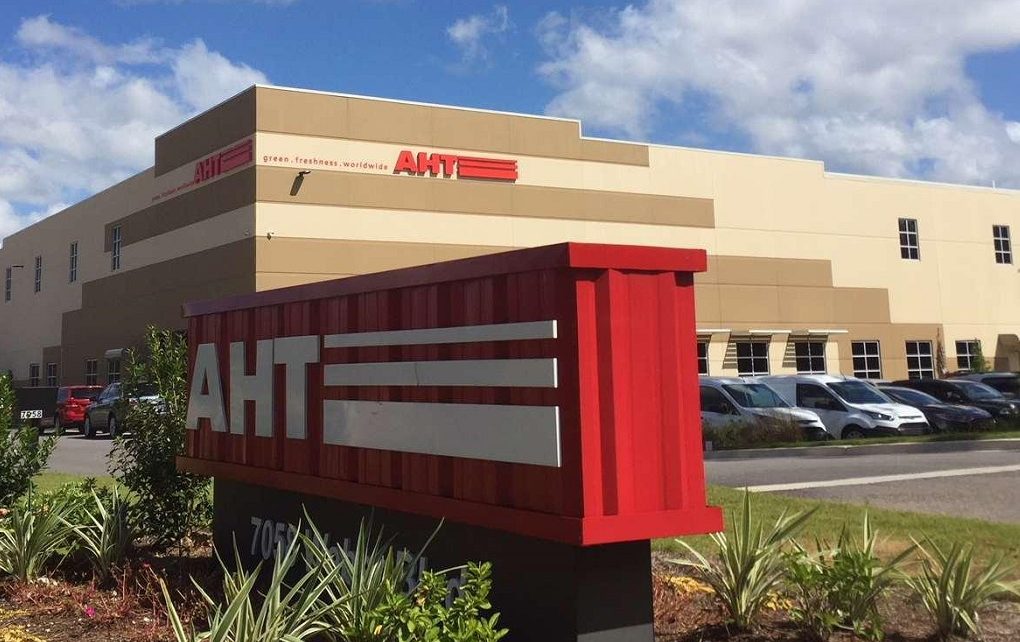
5. Partnerships and Collaborations
Strategic partnerships with startups, companies, and manufacturers are integral to Daikin’s marketing strategy, enhancing its capabilities and market reach. In 2019, Daikin partnered with Fairy Devices Inc., a University of Tokyo startup, to advance air conditioner maintenance and inspection services. This collaboration leverages Fairy Devices’ cutting-edge voice recognition, data analysis, and edge AI technologies alongside Daikin’s extensive expertise in HVAC systems. By integrating these advanced technologies, Daikin aims to enhance the efficiency and reliability of its air conditioning units, offering superior maintenance solutions that minimize downtime and improve customer satisfaction.
In 2024, Daikin and Miura entered a capital and business partnership focused on improving energy savings and reducing CO2 emissions at industrial sites. This collaboration targets the reduction of unintentional heat losses by utilizing waste heat at industrial heat utilization sites. The partnership aims to innovate in the realm of industrial energy efficiency, leveraging Daikin’s HVAC expertise and Miura’s capabilities in boiler technology. This initiative not only promotes sustainability but also aligns with global efforts to reduce carbon footprints in industrial operations, showcasing Daikin’s commitment to environmental responsibility.
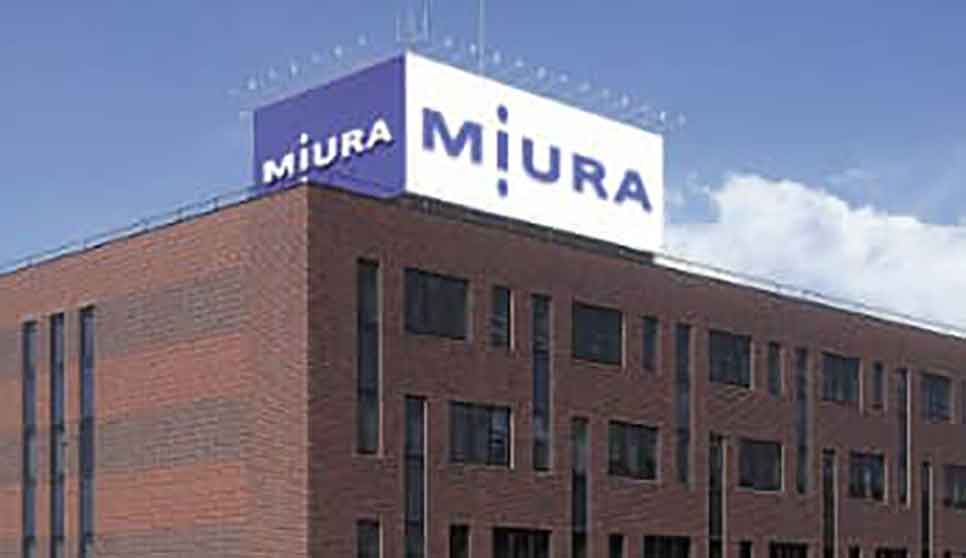
Daikin’s acquisition of Goodman Manufacturing Company, L.P., with sales and service operations based in Miami, Florida, significantly strengthened its presence in the North American market. This strategic move allowed Daikin to leverage Goodman’s extensive distribution network and established market presence. Furthermore, partnerships with companies like Cri-Tech, Inc., and MDA Manufacturing, Inc., provide Daikin with robust manufacturing bases in key locations such as Hanover, Massachusetts, and Decatur, Alabama. These collaborations enhance Daikin’s production capabilities and ensure a consistent supply of high-quality HVAC products. Additionally, Daikin’s partnership with Duplomatic in Italy underscores its global reach and ability to adapt to regional market demands. Through these strategic partnerships and collaborations, Daikin continues to innovate, expand its market presence, and reinforce its position as a leader in the HVAC industry.
6. Trade Shows and Events
Participation in trade shows and industry events is a critical component of Daikin’s marketing strategy, providing a platform to showcase its latest innovations and engage with key stakeholders. Daikin regularly participates in major HVAC and construction trade shows such as the AHR Expo, the largest HVACR event, which attracts professionals from around the globe. At these events, Daikin exhibits its cutting-edge products, including advanced air conditioning systems, energy-efficient solutions, and smart HVAC technologies. These exhibitions allow Daikin to demonstrate the capabilities and benefits of its products firsthand, fostering relationships with potential clients, partners, and industry experts.
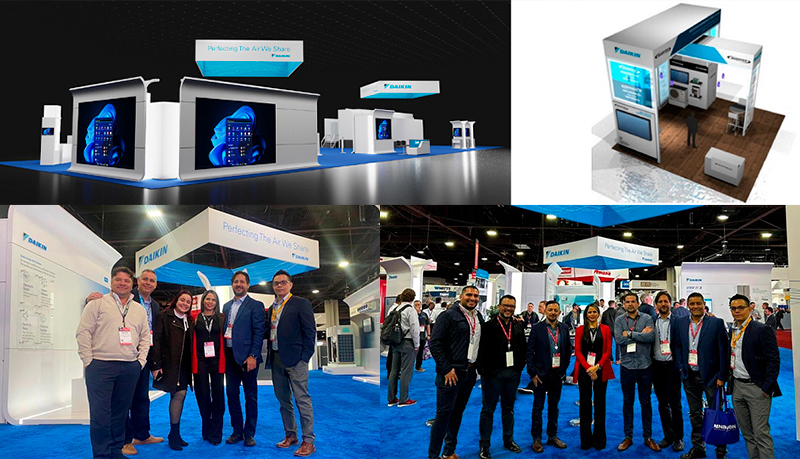
In addition to showcasing products, Daikin uses these events to engage in industry dialogues and gain insights into emerging trends and customer needs. For instance, at the AHR Expo, Daikin often hosts seminars and presentations on topics like sustainability, energy efficiency, and technological advancements in HVAC systems. These sessions not only position Daikin as a thought leader in the industry but also provide valuable feedback and market intelligence that can inform future product development and marketing strategies. By actively participating in trade shows and events, Daikin strengthens its brand presence, builds credibility, and stays at the forefront of industry developments, ensuring it continues to meet the evolving needs of its global customer base.
7. Sustainability and Corporate Social Responsibility (CSR)
Sustainability and Corporate Social Responsibility (CSR) are integral to Daikin’s marketing strategy, reflecting the company’s commitment to environmental stewardship and community engagement. Daikin places a strong emphasis on developing eco-friendly products and sustainable business practices, which is evident in its pioneering use of the R-32 refrigerant. This refrigerant has a lower global warming potential compared to traditional refrigerants, significantly reducing the environmental impact of its products. By promoting these environmentally friendly innovations, Daikin not only complies with global environmental regulations but also appeals to eco-conscious consumers who prioritize sustainability in their purchasing decisions.
Daikin’s CSR initiatives extend beyond environmental sustainability to encompass a wide range of community-focused activities. The company actively participates in educational programs, disaster relief efforts, and community development projects. For instance, Daikin collaborates with Habitat for Humanity to provide affordable housing solutions and improve living conditions in underserved communities. These CSR activities enhance Daikin’s brand image by demonstrating its dedication to social responsibility and community support. Additionally, Daikin’s involvement in global initiatives such as the Kigali Amendment to the Montreal Protocol highlights its commitment to reducing greenhouse gas emissions and combating climate change. By integrating sustainability and CSR into its marketing strategy, Daikin not only enhances its corporate reputation but also builds stronger relationships with consumers, partners, and communities worldwide.
Daikin’s marketing strategies are comprehensive and multifaceted, focusing on product innovation, strong branding, customer-centric approaches, and leveraging digital platforms. Their emphasis on quality, sustainability, and excellent customer service helps them maintain a competitive edge in the global market.
Marketing Mix of Daikin
The marketing mix, or 4Ps (Product, Price, Place, Promotion), is a foundational model in marketing. Here’s a detailed exploration of Daikin’s marketing mix:
1. Product
Product Range and Quality: Daikin offers a comprehensive range of HVAC products designed to meet various needs across residential, commercial, and industrial sectors. The product portfolio includes air conditioners, air purifiers, heat pumps, and refrigeration systems. Daikin’s product range is characterized by its high quality, advanced technology, and reliability. For example, the company’s air conditioning systems are renowned for their efficiency, durability, and innovative features such as Variable Refrigerant Volume (VRV) technology, which allows for precise temperature control and energy savings.
Innovation: Innovation is a cornerstone of Daikin’s product strategy. The company invests heavily in research and development to introduce cutting-edge technologies. Notable innovations include the development of the R-32 refrigerant, which has a lower global warming potential and is more energy-efficient than traditional refrigerants. Additionally, Daikin’s smart HVAC systems can be controlled via smartphone apps, providing users with convenience and advanced control options. These innovations not only enhance product performance but also address environmental concerns, aligning with global sustainability trends.
Customization and Adaptability: Daikin offers customized HVAC solutions tailored to specific market needs. For example, in colder regions, Daikin provides heat pumps capable of efficient heating even in low temperatures. In tropical areas, their air conditioners are designed to withstand high humidity and temperatures. This adaptability ensures that Daikin products can meet diverse customer requirements across different geographies.
2. Price
Competitive Pricing Strategy: Daikin employs a competitive pricing strategy to make its high-quality products accessible to a wide range of customers. While Daikin products are generally positioned in the mid-to-premium price segments, the company ensures that the pricing reflects the advanced technology and superior quality offered.
Tiered Pricing: To cater to different market segments, Daikin uses a tiered pricing approach. For instance, the premium VRV systems are priced higher due to their advanced features and energy efficiency, whereas standard split air conditioners are priced more affordably to attract cost-conscious consumers. This tiered pricing strategy allows Daikin to target both high-end and budget-conscious segments effectively.
Value for Money: Despite being priced higher than some competitors, Daikin products are perceived as offering excellent value for money due to their durability, energy efficiency, and low maintenance costs. This perception is reinforced by Daikin’s strong brand reputation and the long-term benefits of its products, which often result in lower total cost of ownership for customers.
3. Place
Global Distribution Network: Daikin has an extensive global distribution network, ensuring its products are widely available across over 150 countries. This network includes direct sales, authorized dealers, and strategic partnerships, allowing Daikin to reach a broad customer base. By maintaining a strong presence in both urban and rural areas, Daikin ensures accessibility and convenience for customers worldwide.
E-commerce Platforms: Recognizing the shift towards online shopping, Daikin has established a significant presence on major e-commerce platforms such as Amazon, Alibaba, and Flipkart. This allows customers to purchase Daikin products online, access detailed product information, and read customer reviews. The online store on Daikin’s official website also provides a convenient shopping experience, enabling customers to compare products and make informed decisions.
Local Adaptation: Daikin adapts its distribution strategies to meet local market conditions. For instance, in emerging markets, Daikin partners with local distributors who have a deep understanding of regional customer preferences and logistical challenges. This localization ensures that Daikin products are effectively marketed and distributed to meet specific local demands.
4. Promotion
Advertising and Branding: Daikin uses a mix of traditional and digital advertising to promote its products. The company’s marketing campaigns often highlight the innovative features, energy efficiency, and environmental benefits of its products. For example, the “Perfecting the Air” campaign showcases Daikin’s commitment to providing superior air quality and climate control solutions.
Trade Shows and Events: Participation in trade shows and industry events is a key promotional strategy for Daikin. Events like the AHR Expo provide a platform for Daikin to showcase its latest innovations and engage with industry professionals. These events help Daikin build relationships with potential clients and partners, gain industry insights, and reinforce its brand presence.
Corporate Social Responsibility (CSR): Daikin’s CSR initiatives play a significant role in its promotional strategy. The company’s efforts in sustainability, such as developing eco-friendly refrigerants and engaging in community development projects, enhance its brand image. By promoting these initiatives, Daikin demonstrates its commitment to environmental responsibility and social welfare, which resonates well with eco-conscious consumers.
Daikin’s marketing mix effectively leverages product innovation, competitive pricing, extensive distribution, and strategic promotion to maintain its leadership position in the HVAC industry. By continuously adapting to market trends and customer needs, Daikin ensures its products and brand remain relevant and appealing across diverse global markets.
Also Read: Marketing Strategies and Marketing Mix of LG Electronics
To read more content like this, subscribe to our newsletter

